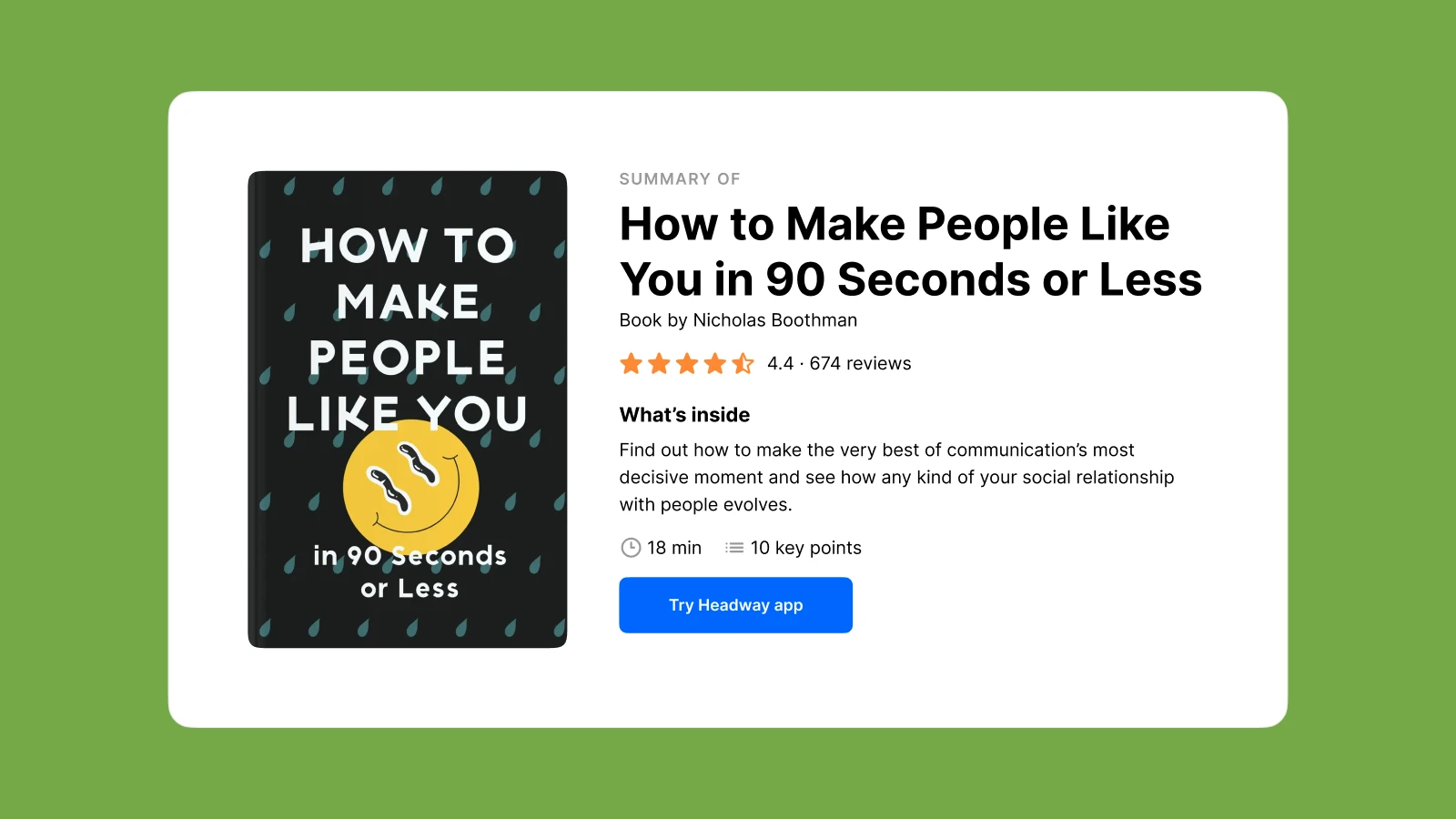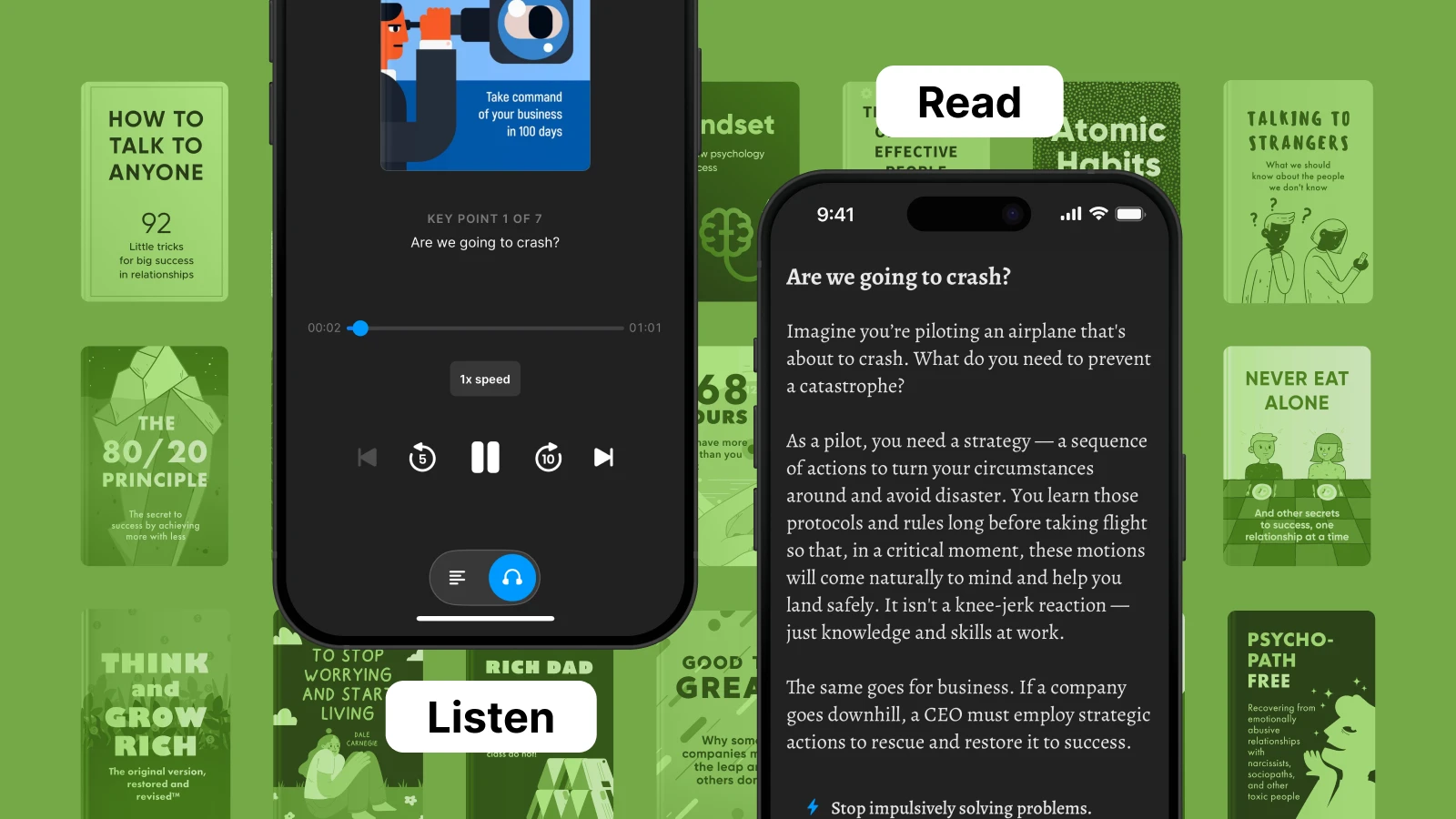Ever feel like you know exactly what you want to say, but the words just don't come out right? Learning how to become a well-spoken person is a much-needed skill in personal and professional life. It can help you express yourself clearly and make sure people hear what you're saying, whether it's your friends or colleagues.
It's not about using fancy or complicated words — It's about owning your voice and speaking with confidence and meaning. When you master communication and strong speaking skills, it can transform your life by:
Opening doors
Building powerful connections
Setting you apart in every room you enter
And the best part? You don't have to be born with the gift of gab. Becoming an articulate speaker is a skill anyone can build with practice and the proper support. Here's a quick overview of how you can do it:
Start practicing small habits daily
Slowing your speech (or, in some cases, talking faster)
Expanding your vocabulary (learn one new word a day)
Listen more, and speak less — this way, you can notice how other well-spoken people articulate
In this article, inspired by influential books like 'You Can Heal Your Life' and 'How to Talk to Anyone,' you'll find easy ways to cut out common mistakes with practical tools like the Headway app that help build self-confidence in your voice.
Ten practical steps to become a well-spoken person
Becoming well-spoken is a journey that blends self-awareness, regular practice, and using the right tools. Here are ten practical steps to improve your speaking skills and help you express yourself more clearly, confidently, and with impact.
Expand your vocabulary daily
Make it a daily habit to learn and use new words. Reading books, articles, or reliable sources is a great way to expand your vocabulary. Try to naturally work them into your conversations as you come across new terms. Use a thesaurus — a helpful tool when you can't find the right words to express your thoughts or opinions.Practice mindful listening
Being well-spoken isn't just about talking — it's about truly listening patiently. Pay attention to what others say so that you can respond thoughtfully. Mindful listening improves your ability to reference others' points accurately, improving your verbal communication skills.
Use the Headway app for focused learning
Use tools like the Headway app to access concise book summaries and key communication, leadership, and self-growth lessons. Headway helps you absorb proven speaking techniques and vocabulary, making your path to becoming a better speaker smoother and more manageable.
4Record and review your speech
Try recording yourself talking on different topics and listening back with a critical ear. Notice any filler words like "um" or "like," pacing issues, or unclear pronunciation.
This perspective will help you recognize your speech patterns and identify areas for improvement. Focusing on your enunciation is key to speaking well.
Develop controlled breathing techniques
Practice deep, steady breathing — like diaphragmatic breathing — to support calm and confident speech. Take a deep breath before talking — it helps reduce nerves and keeps your voice clear, especially if you fear public speaking.
Slow down your speech
Make a conscious effort to slow your speaking pace. This helps your message come through clearly and gives your listeners time to absorb what you're saying, rather than filling every pause with "um" or "like." Get comfortable with a bit of silence. A short pause can make your words hit harder and help you sound more confident and in control.
Master proper grammar and sentence structure
Review basic grammar rules and practice building clear, complete sentences. Proper grammar raises your credibility, and others can better understand your thinking.
Pay attention to tone and inflection
Vary your voice's pitch and tone to highlight key points and keep your audience interested. Avoid speaking in a monotone by practicing a more expressive style, showing enthusiasm and confidence.
Practice public speaking regularly
Look for chances to speak in front of others — whether it's a work presentation, a meeting, or a group like Toastmasters. The more you practice, the more your confidence grows, your anxiety fades, and your communication ability improves.
Reflect and seek feedback
After a talk or conversation, think about what went well and where you can improve. Ask trusted friends or colleagues for honest feedback. Remember, the first time you get feedback, it might feel a bit uncomfortable. However, it's vital for your growth as a stronger, more confident speaker.
Want to improve your skills? Read or listen to the book summary of 'Difficult Conversations' by Douglas Stone. It provides practical strategies for handling tough discussions with clear communication and empathy — skills every well-spoken person needs to navigate any situation with confidence.
Why being well-spoken matters more than ever today
Being well-spoken matters more than ever today because the way you express yourself shapes how others see you. In a fast-moving world, your words are often your first, and sometimes the only chance to make an impression.
Learn how this skill can benefit your life:
It helps you connect better with the people closest to you
You can find new career opportunities much faster
Everyone respects a confident speaker — you can become one
Today, speaking clearly and confidently isn't just a nice skill — it often makes the difference in success and happiness. Here's why being well-spoken matters from social, professional, and psychological angles:
Social benefits:
Stronger connections within the community
People trust you more, as they see a friendly person in you
A good impression lasts for a long time — it's a great benefit!
Professional benefits:
It's a skill that helps you get hired or promoted because it shows you're ready to take on more
You can explain your ideas clearly in meetings or when collaborating with someone
Being well-spoken opens doors to leadership roles and higher paychecks
Psychological benefits:
You feel less worried about speaking up at work or with friends
You stay calm and in control during tough talks or public speaking
Feeling in control helps you handle challenges better and feel more balanced

Nicholas Boothman's book, 'How to Make People Like You in 90 Seconds or Less,' shows how critical first impressions are and how quickly you can build rapport using body language and speech patterns. Whether you're an audiobook enthusiast or a podcast fan, this book summary is a great way to start if you want to improve your skills today!
In short, learning to be well-spoken builds essential social skills and sharp verbal communication that help you succeed in every part of life. It's an investment in your ongoing journey of self-improvement.
How Headway helped users become better communicators: Success stories
For many people, becoming a more confident, well-spoken communicator didn't start with public speaking courses or hours of reading — it began with a 15-minute daily habit.
Melissa Sierra, an EVP navigating high-stakes leadership, turned to daily learning after feeling pulled in too many directions, trying to grow both personally and professionally.
"I wasn't looking for more information — I was looking for clarity, insight, and a way to stay consistent."
This insight didn't just shape how she thought — it shaped how she spoke. Over time, Melissa found herself more mindful of how she communicated with her team:
"I now ensure my words have meaning, and that I understand who is on the other side receiving my information."
Jessica Teitelbaum, a remote professional, shared how swapping social media for learning summaries became part of her intentional morning routine. Instead of passive scrolling, she starts her day with "focused reading."
"The insights I get from Headway often come back to me during the day... the ideas linger and make me more thoughtful."
Jessica uses Headway to support everyday clarity, from structured challenges to spontaneous reading.
Rahaf Sobh, a university student, used to feel scattered and inconsistent with her learning habits, and noticed how that impacted her ability to express herself.
"Short bursts of learning helped me remember more and use it. I felt more confident and focused in daily life. It boosted more than just my knowledge… Now, learning doesn't feel random. It's a steady part of my day — and I love it."
Her experience highlights an important shift: becoming well-spoken doesn't require overhauling your life — it's about choosing better inputs, even in small moments.
Common misconceptions about being well-spoken
Many people have mistaken ideas about what it means to be well-spoken. These myths can hold people back from improving their communication skills because they believe being articulate requires natural talent or a vast vocabulary.

Being well-spoken is really about clarity, confidence, and empathy — qualities anyone can develop with practice and intention. The table below shows some common myths and the fundamental truths behind what makes effective communication work.
| Myth | Truth |
|---|---|
It means having a big vocabulary | Clarity and the ability to express ideas simply and confidently matter more than complexity |
Only extroverts can be articulate | Both introverts and extroverts can develop articulate speech through practice and preparation |
Being well-spoken requires sounding "posh" | Authenticity and connection with your audience are more important than adopting a particular accent or style |
You must avoid all filler words completely | Reducing filler words improves clarity, but strategic pauses can be helpful and natural |
Being well-spoken is an innate talent | This is a skill that can be learned and improved, no matter what age |
Understanding these truths gives you the confidence to embrace your unique voice. Also, it helps focus on meaningful communication, not just on sounding fancy.
This way of thinking is depicted in the 'You Can Heal Your Life' book by Louise L. Hay. It highlighting how positive self-belief and conscious effort lead to personal transformation.
Just as Louise L. Hay teaches healing through awareness and affirmations, becoming well-spoken is a journey of self-awareness and steady practice that anyone can take to unlock their full speaking abilities.
How science explains clear and confident communication
Understanding how the human brain processes communication helps explain why some speaking styles work better than others. Studies in neuroscience and psychology show that our brains respond best to speech that has rhythm, tells a story, and is easy to understand.
Harvard Business Review points out that rhythm, stories, and clear language light up different brain parts. Here's why our brains like this kind of communication:
Rhythm: Our auditory centers are naturally tuned to rhythmic patterns, making it easier for listeners to predict and follow your words.
Storytelling: Stories engage the sensory, emotional, and motor areas of the brain simultaneously, making your message more memorable and convincing.
Clarity: Keeping your language clear and simple ensures the audience understands your message without getting confused or misinterpreted.
Weaving these science-backed techniques into your speech patterns and effective communication style can make a stronger, more lasting impact.
Daily micro habits will help you speak more clearly
Adding small, easy habits to your daily routine can make a big difference in improving your conversation skills bit by bit over time. These micro habits require minimal effort but build your confidence and articulation steadily.
Speak more slowly in everyday conversations
Slow down your speech intentionally during casual chats. This small tip will help you speak more clearly, giving listeners a moment to understand what you're talking about.
Read aloud daily
Spend a few minutes every day reading aloud from anything: books, articles, or speeches. This exercise improves:
Pronunciation
Pacing
Vocal confidence
Replace filler words one at a time
Identify common filler words you use, such as "um," "like," or "you know." Focus on eliminating one at a time. Just pause, and fill it with silence or another, more advanced word.
Mirror techniques of eloquent speakers
Choose great speakers you admire and observe their speech patterns, tone, and body language. Try using these techniques during everyday conversations to develop a smoother, more engaging speaking style.
Adding these small habits to your day sets you up for real progress in your communication. Just keep it consistent; making tiny steps regularly can add to big results.
How to speak well in everyday situations: Interviews, dates, and more
Different life scenarios require different measures — learn how to use effective communication methods in every possible situation.
How to sound confident in job interviews
Being well-spoken in a job interview can make all the difference between landing the role and getting overlooked. When nerves are running high, clear and confident communication isn't just a nice extra — it sets you apart and helps you shine.
The way you speak shows your professionalism, emotional intelligence, and readiness to make an impact. Here's how to show up as your best self and speak like a CEO:
Research the company and role: Speak the language of your future employer. Customize your answers by weaving in keywords from the job description, and make sure your examples reflect the company's values and goals.
Practice common interview questions: Don't just rehearse answers — refine your ability to tell your story with clarity and impact. Focus on highlighting relevant skills and achievements without overloading the listener.
Use positive body language: Your words matter, but how you carry yourself matters just as much. Keep steady eye contact, sit up straight, and use purposeful gestures that show confidence and enthusiasm.
Speak with clarity and intention: Pace yourself. Avoid filler words and rambling. Short pauses can make your points land more powerfully than a stream of rushed thoughts.
Ask insightful questions: Show you're not just there to be chosen — you're there to choose the right fit too. Ask thoughtful questions that demonstrate your curiosity, values, and understanding of the role.
| Tip | Purpose |
|---|---|
Prepare STAR responses | Structure answers with Situation, Task, Action, Result |
Pause before answering | Gather thoughts and don't use any filler words |
Mirror the interviewer's tone | Build rapport and connection |
Mastering these techniques helps you present yourself as a well-spoken candidate who can communicate effectively under pressure.
Become an engaging speaker during presentations

A powerful presentation isn't just about what you say — it's about how you make people feel while you say it. Being well-spoken on stage isn't about what words you use — it's about the way you tell them and with what energy.
Here's how you can sound engaging when presenting:
Structure your message with intention: Begin with something that grabs attention. Then, walk your listeners through your key points. Sentences should be short and easy to follow. When you wrap up, end with a takeaway, and even throw in a light joke.
Use vocal variety to bring your message to life: Monotone voices lose the audience's attention fast. Shift your tone, pace, and volume to match your message and emotions, it keeps listeners engaged and signals what truly matters.
Pause to make it powerful: Don't fear silence. Pausing between points gives your audience space to process and adds weight to your message.
Incorporate visuals that support, not distract: Slides and props can clarify complex ideas, but keep them simple. Speak from your heart, not from your slides.
Make it a conversation, not a monologue: Establish eye contact, read the room, and invite interaction. Sometimes, just asking “how are you feeling today” or sharing a smile will do the trick. It doesn’t take much to make your audience feel connected.
| Tip | Benefit |
|---|---|
Rehearse a few times | Builds confidence and reduces anxiety |
Record sessions | Identifies areas for improvement |
Use storytelling | Makes presentations memorable |
These techniques will help you become a well-spoken presenter and capture attention to deliver your message confidently.
How to communicate well on first dates
First dates can feel nerve-wracking, but they're really just about having a good conversation and seeing if you click. You don't have to say everything perfectly: focus on being yourself and making your thoughts easy to follow. Here's how you should do that:
Listen attentively: Nod, make eye contact, and ask follow-up questions. This way, you show that you really care about the date.
Share stories: Personal funny stories and jokes are great silence breakers!
Keep it relaxed: Don't try to impress your date with fancy words. Speak like you do in daily life — authenticity matters more.
Mind your tone and tempo: Take your time to speak clearly. Rushing can make you seem nervous.
Lead with empathy: Be open to different opinions and emotions. A little compassion goes a long way toward making someone feel safe and seen.
| Tip | Purpose |
|---|---|
Ask open-ended questions | Encourage deeper dialogue |
Avoid controversial topics initially | Keep the mood light and positive |
Use humor appropriately | Build comfort and ease tension |
Effective communication on first dates lays the foundation for meaningful relationships by demonstrating your ability to connect thoughtfully.
Be calm and well-spoken in difficult conversations or debates
Unfortunately, it's hard to avoid unpleasant conversations. However, they don't have to turn into big fights. Being well-spoken in moments like these means picking clarity and calm. Here's how you should handle sensitive moments:
Stay calm: To manage your emotions and keep the debate productive, take a deep breath before, and don't overreact.
Speak from your experience: Use "I" statements to express your thoughts or feelings without assigning blame.
Truly listen: Let the other person speak without interrupting. Acknowledge their points — even if you disagree — to show you're trying to understand.
Clarify and paraphrase: Reflect back what you've heard to confirm understanding and uncover any miscommunication early on.
Know when to pause: Sometimes, agreeing to disagree is the most respectful outcome. You can maintain professionalism without forcing agreement.
| Strategy | Impact |
|---|---|
Pause before responding | Avoid reactive or defensive replies |
Maintain a steady tone | Keep things calm and show respect |
Focus on problems, not people | Keeps discussion productive and respectful |
These techniques are reflected in the book summary 'Selfie' by Will Storr, where the author highlights how self-awareness and empathy can transform our communication. Understanding your own and others' motivations, you can become a more well-spoken person, even in challenging conversations.
Four common speaking mistakes that undermine your confidence
Nobody's perfect, even people with PhDs make mistakes when speaking. Remember: a well-spoken person doesn't care about what to say — it's about how they say it. Here are four common mistakes that learners make:
1. Over-apologizing
Saying "I'm so sorry" too often creates an impression of an unsure person. Yes, owning up to your mistakes is important, but apologizing too much can make others doubt your credibility.
Instead: Try using more assertive phrases: change out "Sorry, but…" for "Thanks for your patience" or "Let me clarify."
2. Using jargon to sound smart
Overloading your speech with complicated terms or technical lingo might feel impressive, but it often confuses or distances your audience.
Instead: Prioritize clarity. Explain things in simple, relatable language so everyone walks away understanding your message.
3. Interrupting
Cutting people off, whether out of excitement or impatience, signals a lack of respect and can shut down honest dialogue.
Instead: Listen fully before responding. Pause, reflect, then add your thoughts. This shows emotional intelligence and builds rapport.
4. Ending sentences in a question
Don't raise the intonation at the end of a statement (also known as "upspeak"), as it can unintentionally make you sound unsure.
Instead: Finish sentences with a downward tone, as you'll sound credible and impactful.
Start speaking up with Headway — you deserve to be heard!

Being well-spoken isn't just about having the right words — it's about finding your voice, speaking confidently, and connecting with people meaningfully. When you communicate clearly and authentically, everything changes.
You build stronger relationships, grow in your career, and handle tough conversations more easily and self-assuredly.
You don't need to be perfect, just consistent. Becoming a well-spoken person is something you build over time, through practice, curiosity, and learning from great communicators.
With the Headway app, you can build those skills in just 15 minutes daily. Whether you want to improve your storytelling, speak up more in meetings, or simply feel more confident expressing yourself, you can grow at your own pace with us.
FAQs about how to become a well-spoken person
How can I train myself to speak well?
Train yourself to speak well by practicing intentional habits daily. For example, read aloud, record yourself, slow down your speech, and expand your vocabulary through books. Focus on listening actively and thinking before speaking — 15 minutes a day can transform how you express your thoughts.
Why can't I speak clearly?
You might struggle with clear speech due to many reasons, some of which include:
Anxiety
Rushed thoughts
Limited vocabulary
Lack of practice
Clarity comes from slowing down, breathing deeply, and organizing your thoughts. Training your articulation through special exercises helps you sound more deliberate and understandable over time.
How do confident people talk?
Confident people speak with a steady pace, clear tone, and thoughtful pauses. They avoid filler words, make eye contact, and choose words intentionally. They're not out to impress anyone; they just speak to connect and be clear. When someone talks calmly and confidently, that naturally draws people in.
How do I stop mumbling?
Mumbling often happens when you're nervous or rushing. To stop mumbling, you should:
Slow your speech
Open your mouth more when talking
Practice enunciating each word
Try reading aloud daily and recording yourself to catch unclear patterns. Breathing exercises also help stabilize your voice and give your words more presence.
Do people like those who speak well?
Yes, many people, including women, are drawn to those who speak well. Being well-spoken shows that you're intelligent and emotionally self-aware. It's not about using big words — expressing yourself clearly and listening attentively are the keys. Good communication builds connection, which is often more attractive than looks or charm.
How can I speak beautifully?
To speak beautifully, slow down and talk like you genuinely care about what you're saying. Let your words come out naturally, and don't rush; give each thought a moment to breathe. Use language that paints a picture or makes people feel something. Listen to eloquent speakers or read poetry, and it'll rub off on you.
Can an introvert be a good public speaker?
Absolutely. Introverts often make powerful public speakers because they think deeply, prepare thoroughly, and speak with purpose. With practice and the proper techniques, introverts can captivate audiences just as effectively as extroverts. Quiet strength is a superpower on stage.













